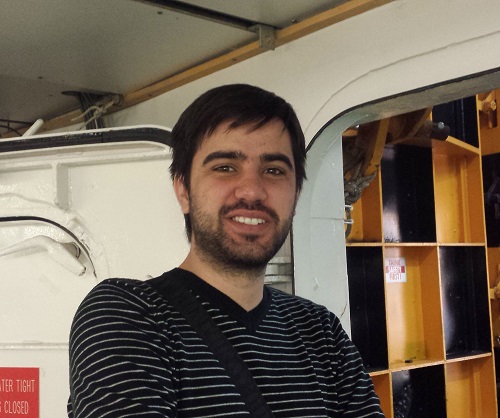Update
We finished our last CTDA research tool that is submerged in the water to measure conductivity (salinity), temperature, and depth. yesterday! It was another really deep one—3800m. Afterwards we celebrated with chocolate (an increasingly rare treat on the ship… as is fresh fruit). We also turned off the multi-beam early this morning as we’ve left the continental shelf. We’re turning to head back towards Hobart, but still have some Argo floats to deploy. Although we’re finished collecting data for the trip, there is still work to do. We have to clean up and pack up all the equipment for shipping back to the U.S., and we can begin processing some of the data on the ship. We have a good amount of time, as it will take at least 10 days of travel to get back to the dock.
Meet the Scientists: Ricardo Correia

What do they do?
Ricardo is one of the scientists that helps run the multi-beam bathymetry equipment and processes the bathymetry data. Ricardo also assists in collecting, processing, and analyzing any mud core samples we take.
How did he get where he is now?
Ricardo has always been very curious about the world. As a child, he was given fossils which sparked his interest in geology. He built up a nice mineral collection, which he still has to this day. His favorite piece of his collection is a complete geode, which reveals something beautiful hidden inside when it’s opened. In addition to loving rocks and fossils, he also had a strong affinity for math. At University he found a way to combine his love of geology and math together in geological engineering. Ricardo got involved in this particular expedition when his graduate school advisor, who had worked with the Chief Scientist—Dr. Frank Nitsche--recommended him to the position. This is his first Antarctic research trip.
Favorite part of the job
One of the things Ricardo loves most about science is that you get to find new answers to problems and help people. In science you’re constantly guided to new discoveries.
Fun Facts
When not at school, Ricardo loves sports. His favorite sport is soccer and he plays for his city team (and he's really good at ping pong as we've learned on the ship). He also loves to do art, particularly pencil sketches.
Learn more
Ricardo is also keeping a blog, in Portuguese, you can visit it at www.propolar.org.


Comments